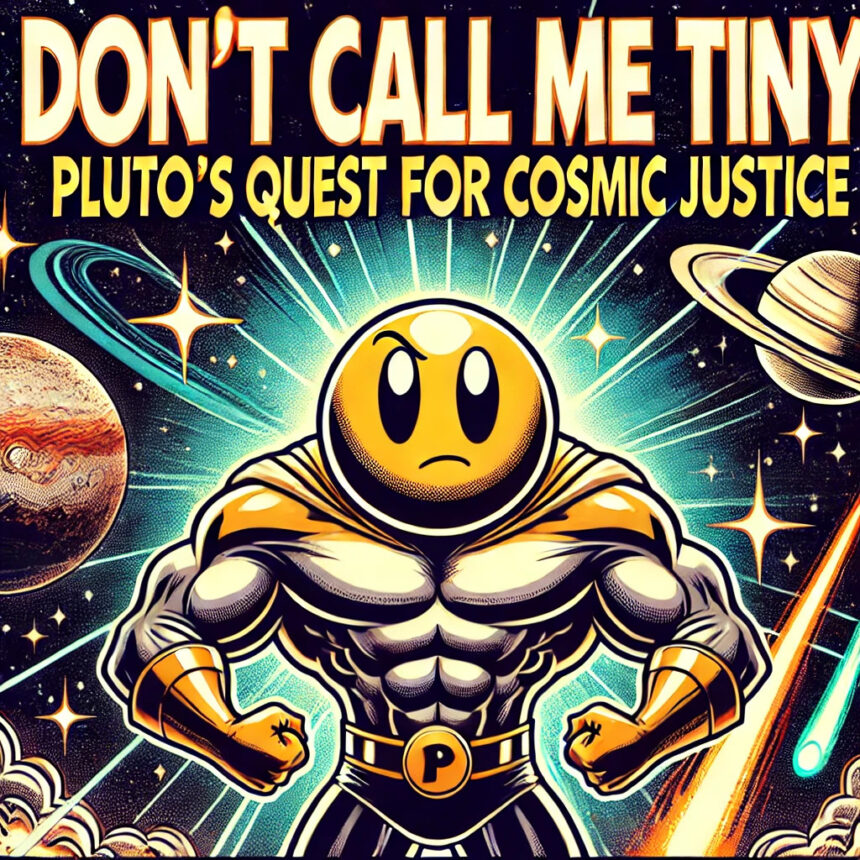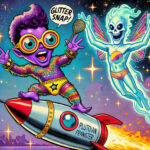Humanity, in its infinite wisdom, had finally figured out how to fold fitted sheets, invented self-fluffing pillows, and created a dating app that actually worked (though it was mostly populated by cats). However, the most significant event of the year wasn’t happening on Earth, but in the vast, glittering expanse of space. The solar system was holding its first-ever election.
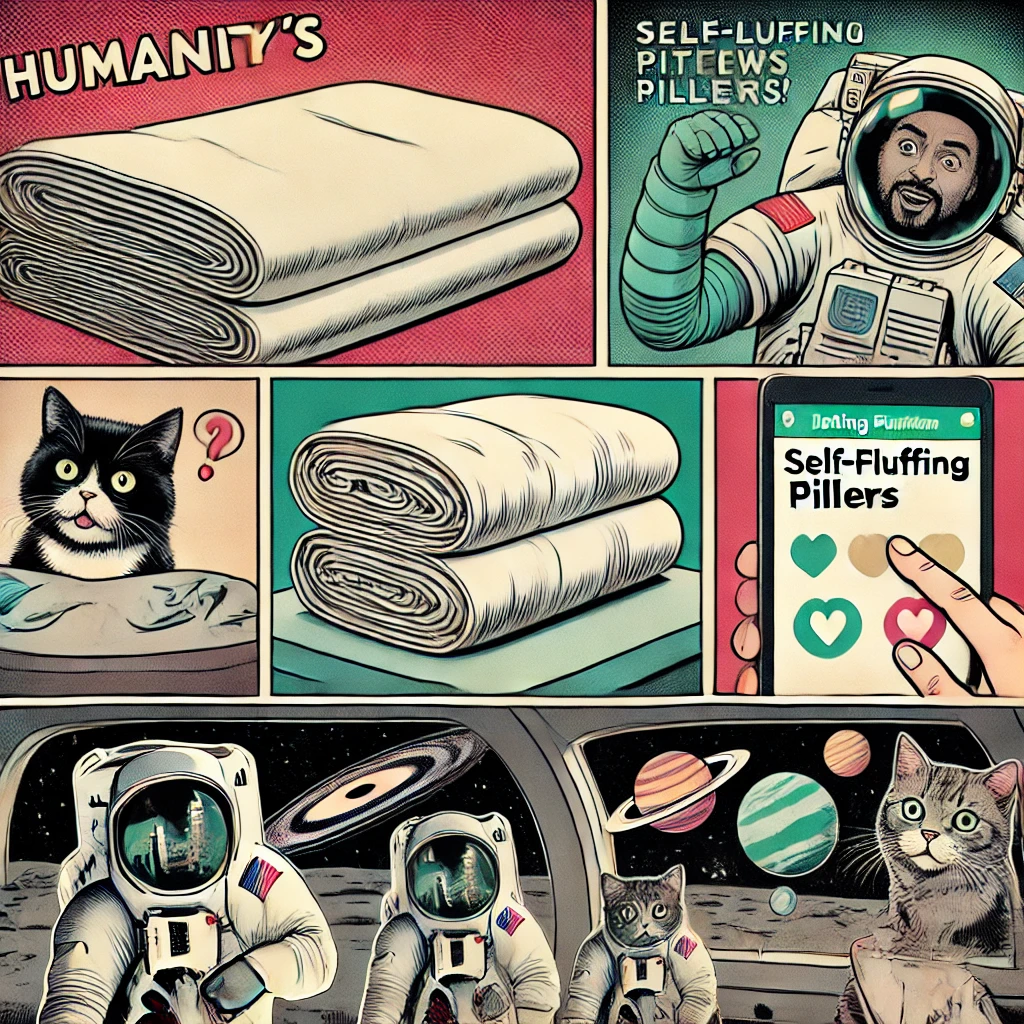
Disclaimer: This is a work of fiction. The names, characters, settings, and events are the result of a perfect handshake between an original concept by the creator and their clever use of AI to arrive at the final output. Any resemblance to actual persons, living or dead, or actual events is purely coincidental.
1: The Great Cosmic Popularity Contest (aka, Why Pluto Needs Anger Management)
Now, you might be wondering, what exactly do celestial bodies vote on? Is it the best black hole for galactic vacations? The most scenic nebula for a romantic asteroid getaway? No, this election was far more crucial. It was a popularity contest. A cosmic referendum on who was the coolest kid in the solar system.
It all started with Jupiter, the arrogant gas giant, who, while showing off his newly formed “Junior Red Spot” (a pale imitation of his famous Great Red Spot) to a group of fawning comets, declared, “Honestly, some of us are just… superior. We have rings, moons, the gravitational pull of a thousand suns… and then there’s… well, Pluto.”
This, naturally, did not go down well with Pluto. He was, after all, a sensitive soul, despite being made of ice. He’d always felt a bit like the awkward kid at the cosmic dance, the one who never got picked for the planetary dodgeball team. And Jupiter’s snide remark, amplified across the solar system by the latest in space-age gossip technology (developed, ironically, by humans on Mars), was the final straw.
Venus, never one to miss an opportunity for drama, seized the moment. “Oh, this is outrageous!” she declared, her voice echoing through the asteroid belt. “We need a vote! A popularity contest! May the best celestial body win!”
And so, the election was set in motion. Mercury, the nervous type, was appointed head of the “Galactic Electoral Commission.” Saturn, with his usual flair for the dramatic, designed the ballot boxes out of discarded rings. Earth, ever the bureaucrat, insisted on a lengthy registration process and a series of televised debates (which were mostly just Jupiter bragging about his storms and Saturn showing off his moon collection).
The campaign trail was a sight to behold. Jupiter, the frontrunner, hosted lavish asteroid-belt rallies, promising increased gravitational pull and shorter orbital periods for all. Saturn, the stylish one, released a line of limited-edition rings and campaigned on a platform of “elegance and sophistication.” Even Uranus, the quiet one, got in on the action, releasing a series of cryptic messages about the “true meaning of planetary existence” that left everyone thoroughly confused.
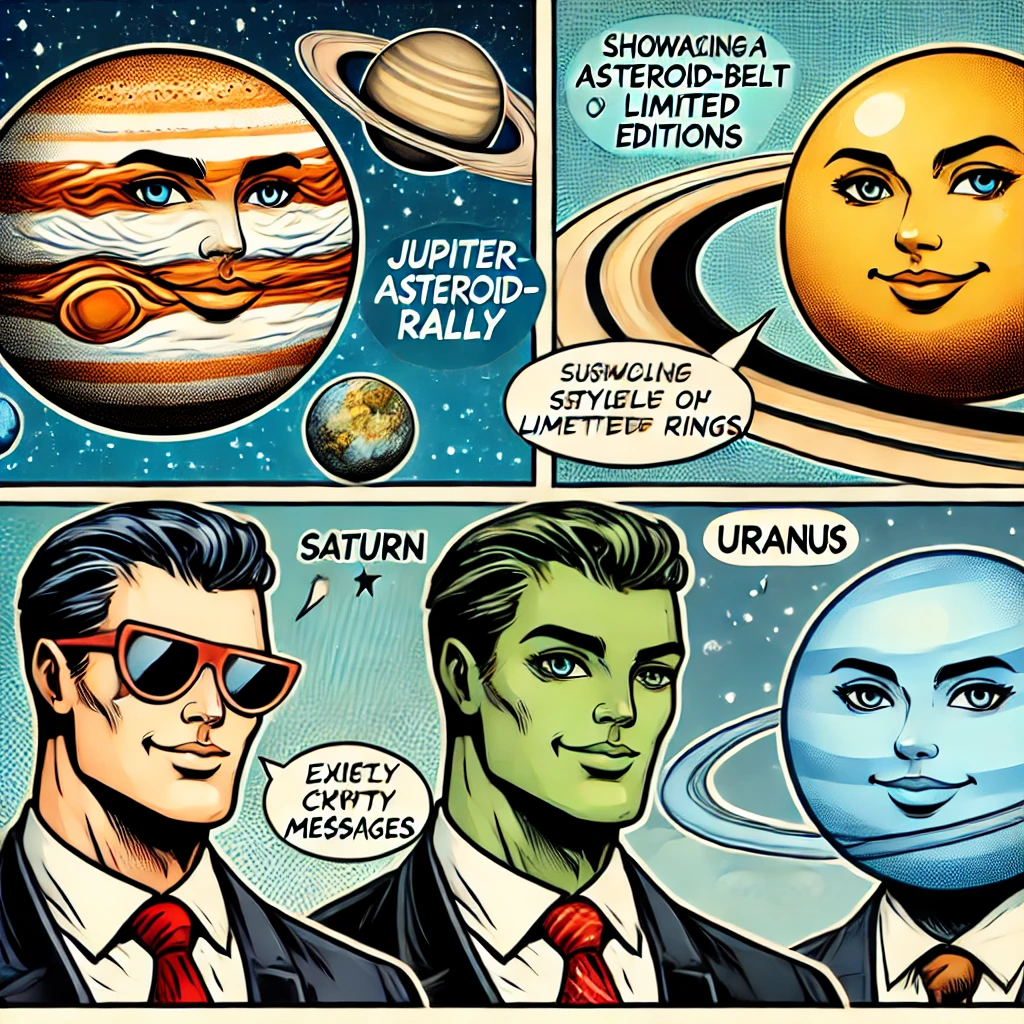
Pluto, meanwhile, ran a grassroots campaign, appealing to the “little guys” of the solar system – the comets, asteroids, and dwarf planets who felt overlooked and underappreciated. He promised a voice for the voiceless, a revolution against the “planetary elite.” He even wrote a campaign song, a surprisingly catchy tune called “Don’t Call Me Tiny,” which became a viral sensation across the galaxy.
But despite his best efforts, Pluto knew he was the underdog. The other planets were bigger, brighter, and, frankly, more popular. And as the election day approached, a sense of dread settled over his icy heart.
The results were announced in a spectacular ceremony hosted by the Sun, who, despite being a star and not a planet, insisted on being the master of ceremonies. The solar system watched with bated breath as the votes were tallied on a giant screen made of pure starlight.
And the winner was… Jupiter. Of course.
Saturn came in second, followed by Uranus, Neptune, Earth, Venus, and Mars. And Pluto… well, Pluto came in last. He was officially, undeniably, and unequivocally demoted. No longer a planet. Just a… “dwarf planet.” A cosmic also-ran.
Pluto’s icy surface cracked with rage. “Dwarf planet?!” he roared, his voice echoing across the cosmos. “This is an outrage! A travesty! I’ll show them! I’ll show them all!”
And with that, Pluto, fueled by a potent cocktail of humiliation, anger, and a dash of cosmic indigestion, embarked on a mission of revenge. The solar system, blissfully unaware of the impending chaos, continued to celebrate Jupiter’s victory. They had no idea what was coming.
2: Pluto’s Revenge: When Bad Aim Meets Good Intentions
Pluto, now officially a “dwarf planet” (a term he loathed with every fiber of his icy being), was determined to make the solar system pay for their perceived injustice. He would show them that even a small, icy underdog could wreak havoc on a cosmic scale!
His plan? Operation Cosmic Chaos. Phase one: asteroid bombardment.
Now, Pluto, despite his fiery temper, wasn’t exactly a master strategist. His knowledge of orbital mechanics was shaky at best, and his aim, well, let’s just say he wouldn’t have won any galactic sharpshooting competitions. But what he lacked in skill, he made up for in enthusiasm.
He started by targeting Mercury, the closest planet to the sun. “I’ll turn that little speedster into a cosmic pincushion!” he cackled, launching a barrage of icy asteroids towards the unsuspecting planet.
Unfortunately for Pluto (and fortunately for Mercury), his aim was so atrocious that the asteroids missed their target by a galactic mile. Instead, they ended up forming a temporary ring around the sun, a rather fetching accessory that the Sun, ever the fashion-conscious star, decided to keep for a few weeks.
Undeterred, Pluto turned his attention to Venus, the glamorous, hot-tempered planet known for her thick atmosphere and love of volcanic spa treatments. “I’ll give her a facial she’ll never forget!” he snarled, launching a volley of frozen methane towards Venus.
But Venus’s atmosphere proved to be a formidable shield. The frozen methane bounced harmlessly off her thick clouds, creating a spectacular light show that the Venusians mistook for a celestial fireworks display. “Ooh la la!” they exclaimed, sipping their Venusian cocktails and enjoying the show.
Frustrated, Pluto aimed for Earth, the bustling hub of the solar system, home to the humans who, despite their obsession with reality TV and avocado toast, had managed to invent some pretty impressive space technology. “I’ll disrupt their precious internet!” he fumed, launching a particularly large asteroid towards the blue planet.
But just as the asteroid was about to enter Earth’s atmosphere, it was intercepted by… the moon. Yes, the moon, Earth’s loyal companion, took the hit for his friend. The impact created a new crater, which the humans, in their infinite wisdom, named “Crater McPlutoface” (much to Pluto’s chagrin).
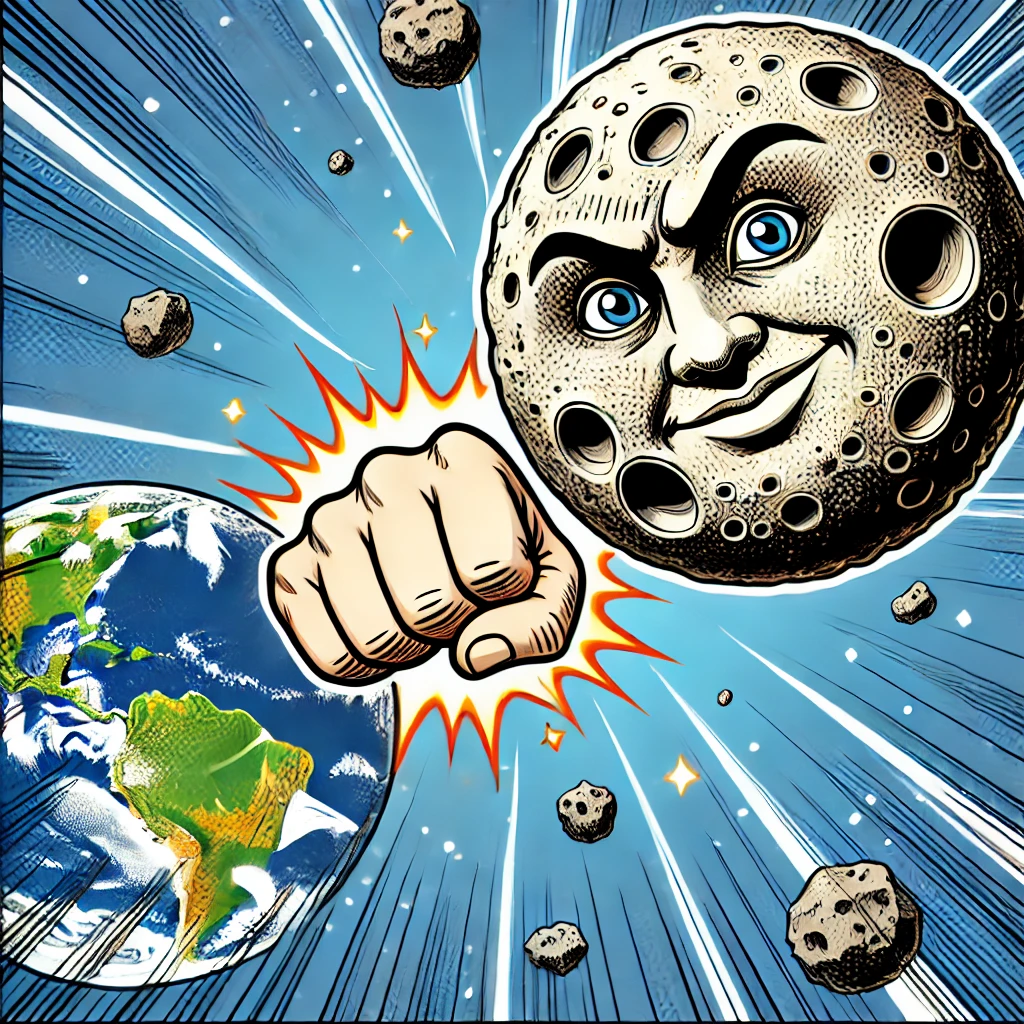
The incident, however, did have one unintended consequence: it knocked the moon slightly off its orbit, causing tides on Earth to go haywire. Surfers rejoiced. Cats were confused. And the International Space Station had to make a few emergency maneuvers to avoid a lunar collision.
Pluto’s attempts to disrupt Mars were equally disastrous. He tried to redirect Phobos and Deimos, Mars’s tiny moons, hoping to turn them into weapons of mass destruction. Instead, he accidentally caused them to switch orbits, leaving Mars looking utterly bewildered. “Wait a minute,” the Martians exclaimed, scratching their helmets, “didn’t Phobos used to be on the left?”
By this point, the rest of the solar system was less terrified and more thoroughly entertained. Jupiter was howling with laughter. Saturn’s rings were rippling with mirth. Even Uranus, usually the stoic one, let out a low rumble of amusement. Pluto’s “reign of terror” was turning out to be more slapstick than apocalyptic.
3: The Interplanetary Intervention (aka, “Pluto, We Need to Talk”)
News of Pluto’s antics reached the ears of the Planetary Council, a newly formed governing body consisting of the eight planets (yes, even Jupiter). They were initially alarmed, but after watching a few hilarious compilations of Pluto’s failed attempts at revenge on the interplanetary news channels, they decided a different approach was needed.
“He’s clearly not a threat,” Earth declared, chuckling at a clip of Pluto accidentally launching a comet into a black hole. “More of a cosmic clown, really.”
“But we can’t just let him continue causing chaos,” Venus argued, adjusting her perfectly sculpted cloud hair. “It’s disrupting my sunbathing schedule.”
“I have an idea,” Jupiter boomed, his voice echoing through the council chambers. “We stage an intervention.”
And so, the eight planets, led by the ever-diplomatic Earth, embarked on a journey to the edge of the solar system, to the cold, dark realm of the Kuiper Belt, where Pluto sulked amongst his fellow dwarf planets.
They found him surrounded by a group of sympathetic comets, all listening intently as he recounted his woes. “And then,” Pluto was saying, his voice cracking with emotion, “they called me a dwarf planet! Can you believe it? A dwarf! Me! The mighty Pluto!”
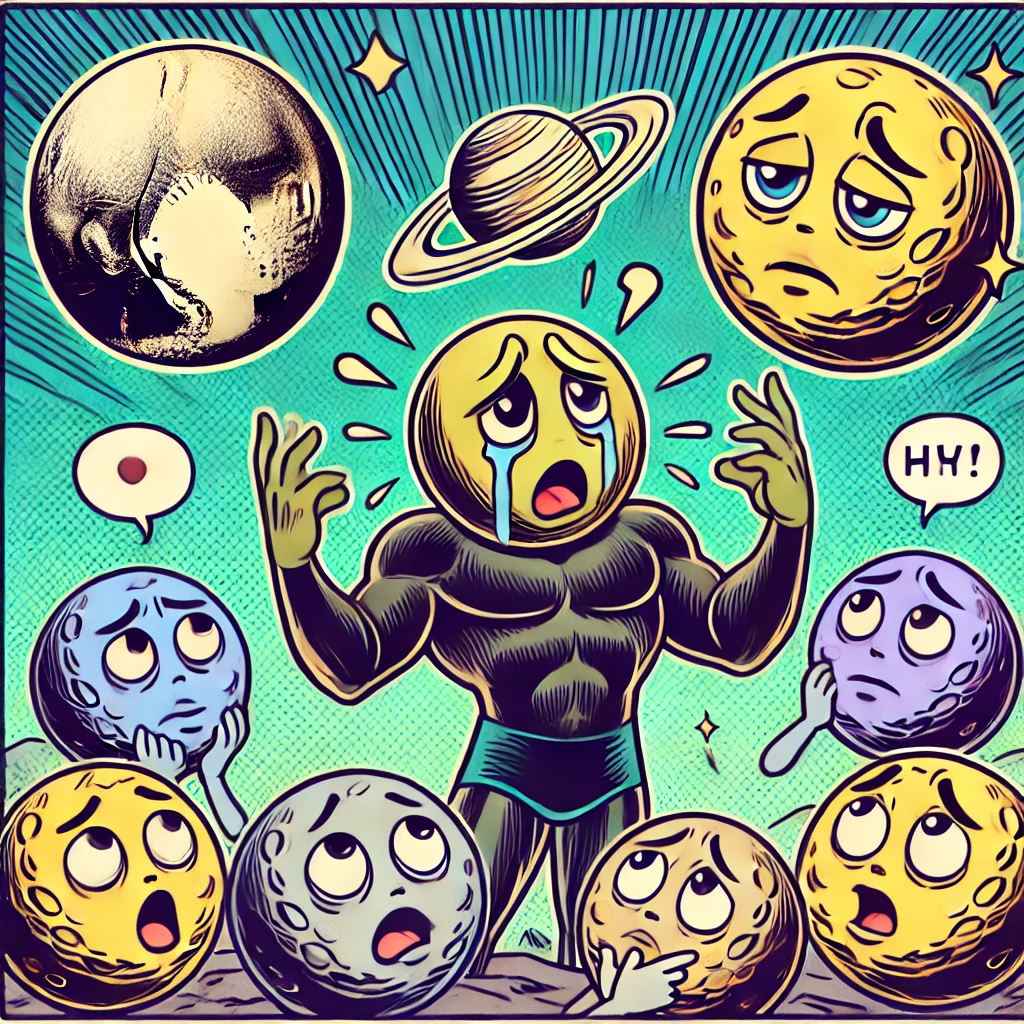
The comets, eager to please, showered him with words of consolation. “You’re not a dwarf, Pluto! You’re a giant among dwarf planets!”
“You’re the coolest celestial body in the Kuiper Belt!”
“We love your craters!”
Pluto, basking in the attention, failed to notice the arrival of the Planetary Council.
“Ahem,” Earth coughed politely.
Pluto spun around, his icy face a mixture of shock and indignation. “What are you doing here?” he sputtered. “Come to mock me some more?”
“No, Pluto,” Earth said gently. “We’ve come to talk.”
“We’re worried about you,” Venus added, her voice surprisingly sincere. “You’ve been acting a bit… erratic lately.”
“Erratic?” Pluto scoffed. “I’m just expressing my rightful indignation! You all humiliated me! Demoted me! Cast me out like a cosmic leper!”
“Now, now, Pluto,” Jupiter said, his voice surprisingly gentle. “We understand you’re upset. But the truth is, you’re an important part of the solar system, planet or no planet. Your gravitational pull, however small, helps keep things in balance.”
“And besides,” Saturn added, “you’ve got Charon! That’s like having a built-in best friend. We’re all a bit jealous, to be honest.”
Pluto looked at his loyal moon, Charon, who was patiently orbiting him, a silent testament to their enduring friendship. He sighed. Maybe they were right. Maybe being a dwarf planet wasn’t so bad. Maybe he didn’t need the label of “planet” to be important.
4: Pluto: Reality TV Star and Kuiper Belt Ambassador
News of Pluto’s change of heart spread through the solar system like wildfire. The asteroids he’d flung were carefully collected and returned to their rightful places (with the exception of the ones the Sun had taken a liking to). The moon was nudged back into its proper orbit. And Pluto, once the outcast, was welcomed back into the cosmic fold.
In fact, his newfound fame as the “rebel with a cause” (albeit a rather clumsy one) made him surprisingly popular. He became the Kuiper Belt’s most eligible bachelor, with comets and asteroids vying for his attention. He even started his own reality show, “Pluto’s Pad,” which chronicled his life as a dwarf planet, complete with awkward dates, asteroid-decorating contests, and the occasional existential crisis.
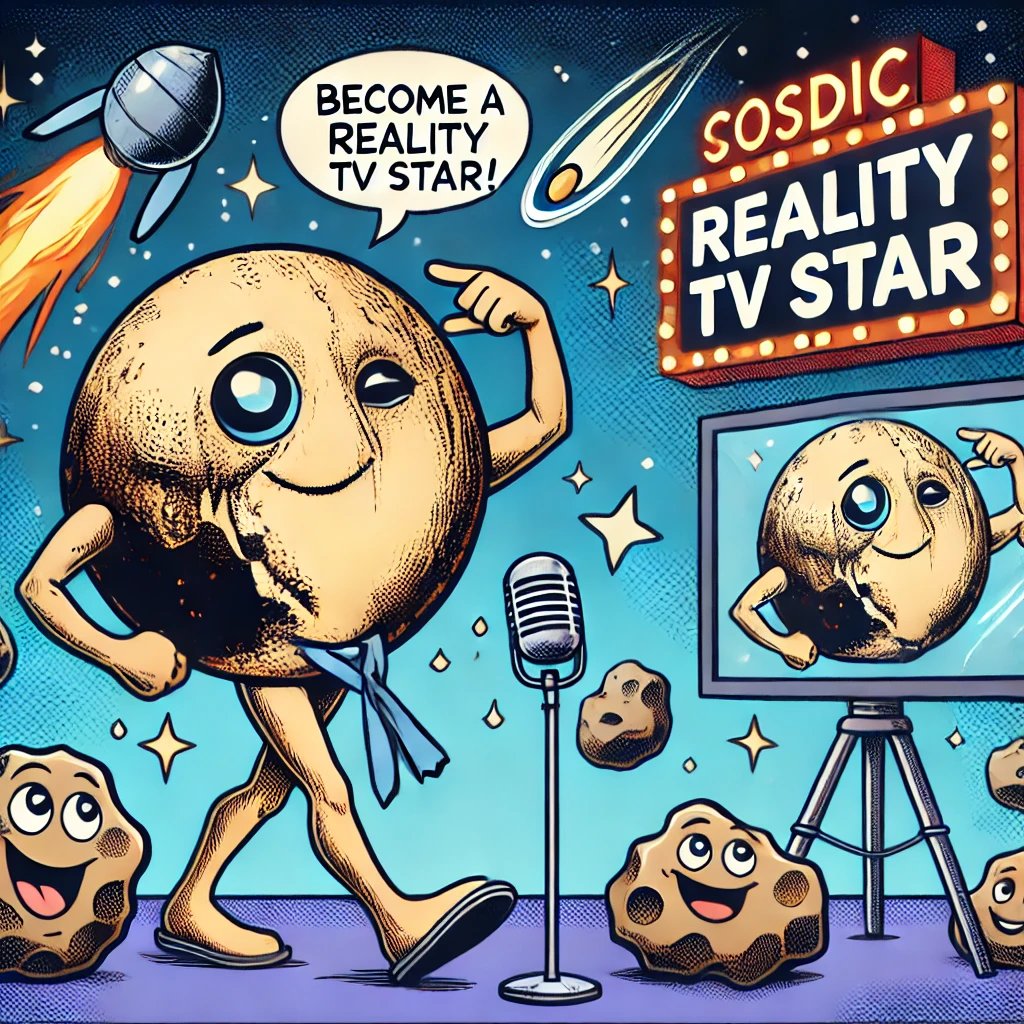
The show was a massive hit, not just in the solar system, but across the galaxy. Pluto became an intergalactic celebrity, his face plastered on comet-shaped cereal boxes and his catchphrase, “Don’t call me tiny!” printed on t-shirts worn by aliens across the universe.
He even became a spokesperson for dwarf planet rights, advocating for their inclusion in the Galactic Federation and demanding that “dwarf planet” be replaced with the more dignified term “celestial underdog.”
And so, the solar system returned to a semblance of normalcy, albeit with a slightly higher tolerance for chaos and a newfound appreciation for the comedic value of a disgruntled dwarf planet. Jupiter continued to brag about his storms, Venus continued to be fabulous, and Earth continued to worry about climate change.
But something had changed. The solar system was no longer just a collection of celestial bodies orbiting a star. It was a community, a family, bound together by laughter, friendship, and the occasional asteroid-induced mishap. And at the heart of it all was Pluto, the dwarf planet who had taught them all that even the smallest among them could make a big impact, even if that impact was mostly comedic.
The End




